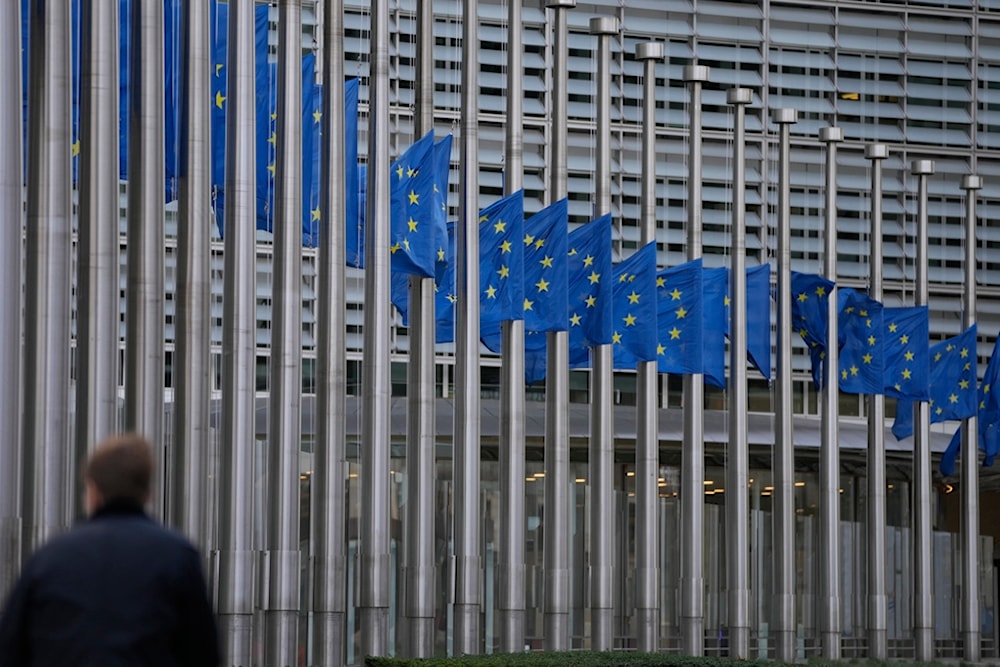South Africa's anti-'Israel' case exposes EU's deep-rooted divisions
The European Union has been rendered useless as no common ground could be found to base a collective, constructive stance that paves the way for resolution.
-

A man walks past European Union flags at half staff, in front of European Union headquarters in Brussels, Thursday, Dec. 28, 2023 (AP)
Belgium's development minister, Caroline Gennez, uncovered divisions within the European Union just a day before South Africa took "Israel" to court on charges of genocide in Gaza.
Addressing German officials, Gennez asked: “Do you really want to be on the wrong side of history twice? Will we continue to stand by while ethnic cleansing takes place? Surely that was ‘never again’?”
This would not be the first time country officials challenged and condemned Germany's stance on the genocide in Gaza, with precedents from Ireland and Spain.
This comes amid Germany's unwavering support for "Israel", forming what German Vice Chancellor Robert Habeck calls a "special" relationship.
According to Politico, divisions in the EU concerning the Palestinian question and the genocide in Gaza stem from an abundance of factors, mainly:
1. The enormously disproportionate death toll between Gaza and "Israel", as the latter turns Gaza into a slaughterhouse resulting in over 23,000 Palestinian deaths.
2. Tangible solidarity with Palestine, mainly perpetrated by Yemen's Ansar Allah in the Red Sea.
3. "Israel" assassinating and martyring a top Hamas chief in the suburbs of Beirut, Lebanon.
4. South Africa taking "Israel" to the International Court of Justice for genocide in Gaza.
Therefore, the European Union has been rendered useless as no common ground could be found to base a collective, constructive stance that paves the way for resolution, triggering criticism, although it has previously generally advocated for a two-state solution and dragged it as a final goal for the matter.
“I cannot imagine a scenario in my whole life where Josep Borrell will solve the Israeli-Palestinian [problem]. I think it’s below zero,” said Anders Persson, a political scientist at Linnaeus University in Sweden.
Europe's frailty exposed
Individually, each member state of the EU has a clear standpoint from the genocide in Gaza, but could not achieve the same collectively, reducing their efforts to restrict the killings of Palestinians to nearly zero. On the other hand, the US, "Israel's" devoted backer, has been preparing to face the regional expansion of the war.
“We are in a state of settling for less, not doing too much, we’re watching the U.S. and then taking a view,” an anonymous French diplomat told Politico.
In other analyses, Sven Kühn von Burgsdorff, the EU’s former head of mission to Palestine, accused the EU of not employing the upper hand against the occupation, exposing the union's weakness in front of "Israel".
“We are not going to spend any political capital on this, the positions are so divergent and irreconcilable. And it is not a top priority in public opinions ahead of European elections,” said the French diplomat on the matter.
The ICJ furthers divisions
The EU will witness the case made by South Africa against "Israel's" conduct in Gaza in the ICJ on Thursday and Friday, however, it does not have jurisdiction to comment on the integrants of the court.
Member nations rushed to comment on the case itself. Germany defended "Israel", saying that the claim of executing genocide in Gaza is false and not covered by the [U.N. Genocide] Convention.”
Another of "Israel's" loyal allies, Austria, told Politico “The accusation of genocide as a ‘crime of crimes’ is extremely serious and should not be made lightly,” but does not plan to participate in the case.
Anti-genocide claims echoed, although South African representatives at the ICJ are confident that the application they submitted "places Israel’s genocidal acts and omissions within the broader context of its 25-year apartheid, 56-year occupation, and 16-year siege imposed on the Gaza Strip."
Some of Belgium's governing parties, on the other hand, wish to participate in the trial, isolating themselves from the rest of the Union. Even Ireland, which has historically been critical of the occupation, opted out of the trial.
In terms of the court trial, Hanan Jarrar, Palestinian ambassador to South Africa told Politico that the case opens segues to establishing a ceasefire, saying that if "Israel" fails to comply with UN litigations, Europe will find it much harder to defend its colonial ally.
Read more: At first ICJ hearing, South Africa provides evidence of 'genocide'
The ship has sailed
The longer "Israel" extends its war on Gaza, the further the EU sways from finding one standpoint that represents all its members. Former US ambassador to the US, Anthony Gardner, said that even in a hypothetical sphere where the EU does agree on a unified stance, the damage would still be done, and it would still be marginalized.
“Europe is mostly just not a player in this conflict and it is struggling with that reality,” Gardner said.
A report by Politico last week detailed that Europe's reputation among countries of the Global South, which had already been damaged by its double standards regarding the War in Ukraine, had become even more damaged following the outbreak of the war on Gaza.
The initial complacency of the West during the War in Ukraine quickly dissipated as the global majority, including over 140 countries at the UN General Assembly, condemned Russia's actions in Ukraine.
The illusion of a united front crumbled as some major countries, notably China and India, refrained from criticizing Russia, revealing a more complex global landscape, the report states.
Europe recognized the need to expand its diplomatic outreach, better explain its views, and listen to the perspectives of other nations, the report says.

 5 Min Read
5 Min Read








